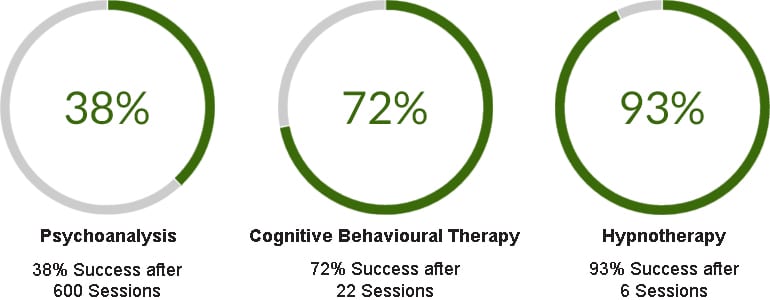
Hypnotherapy: Learn the power of the subconscious mind.
Tim France, Founder of Transformative, is a fully qualified clinical hypnotherapist and member of the Institute of Clinical Hypnotherapists of Ireland (ICHI). Transformative specialises in using clinical hypnotherapy to treat conditions such as: anxiety, panic disorder, fears and phobias, and depression. We also offer a very effective hypnobirthing programme for expectant mothers.
What is clinical hypnotherapy and how does it work? Well, firstly, did you know that we have three different minds?
- Our unconscious mind:
This looks after all the automatic functions in our body… Our breathing, our heart-beat, we shiver when we get cold, we sweat when we get hot etc. - Our conscious mind:
This is where logic, reason, decision-making, judgement and our will-power and short-term memory reside. - Our subconscious mind:
This is where our habits, beliefs, feelings and associations exist, along with our long-term memory and most important of all, for hypnotherapy, our ‘protector’.
The reason it can be hard for us to make changes in our lives: stop over-eating or eating the wrong kinds of foods, stop feeling anxious, overcome a fear, is because our subconscious mind is programmed to be the way we are. It can be very hard to change this programming and we often resort to trying to ‘over-ride’ it using our will-power, which is very difficult and often doomed to failure.
Let us explain why. At some point in our lives we learnt that fire was dangerous and that even though it is fascinating and pretty and looks like it would be soft to the touch, that it would hurt (a lot!) if we put our hand into it. At the point we learnt this, that programming was burnt into the ‘hard drive’ of our subconscious mind. The ‘protector’ in our subconscious mind knows that fire is dangerous and it won’t let us go near enough to it for us to burn ourselves. We would fight very hard indeed if someone tried to force us to hold our hand in a fire… However, if our house was on fire, and (God forbid!) someone we loved was trapped inside, our ‘will-power’ could temporarily overcome our ‘programming’ and we might be able to rush into the burning building to save our loved one.
That is what our will-power is designed for. A temporary over-ride, and that’s why it is so difficult to make permanent, lasting change to ourselves using will-power, which comes from a different part of our mind and that sets up a conflict between our conscious and subconscious mind, that the ‘protector’ within our subconscious mind will nearly always win… Self preservation, our ‘protector’, trumps everything!
But what if we could quieten our conscious mind and make a connection with the deep programming in our subconscious mind in order to make permanent, lasting changes to that programming? That’s what clinical hypnotherapy does. And what if that process was a wonderfully relaxing, peaceful process during which you were in complete control of all the changes being suggested to you and could say “yes” or “no” to them all?
Clinical hypnotherapy is a wonderful, powerful treatment that through a very pleasant and progressive relaxation can access the subconscious mind and help you make the permanent changes you want in your life, whether that’s to lose weight, remove panic attacks or overcome your fear of public speaking… Due to the deep relaxation of mind and body involved, a session of clinical hypnotherapy will not only tackle your issue but will leave you feeling relaxed and rejuvenated.
A study of psychotherapy literature by Dr A. Barrios, which was published in 1970 and originally featured in the The Psychotherapy Journal of the American Psychiatric Association showed some impressive findings. After surveying over 2000 journal articles, Dr. Alfred Barrios came up with the following recovery rates: 38% using psychoanalysis, 72% using Cognitive Behavioural Therapy and 93% using hypnotherapy. So, out of the three different methods it is obvious that hypnotherapy is the most effective. However, the length of time it took to achieve these results is even more significant. Psychoanalysis had a 38% recovery rate after 600 sessions and approximately 12 years. Cognitive Behavioural Therapy had a 72% recovery rate after 22 sessions and approximately 6 months. Hypnotherapy, on the other hand, had a 93% recovery rate after just 6 sessions and approximately 1-2 months.
We use techniques and procedures here at Transformative that achieve the same results in 3 to 5 sessions on average.

As we can treat so many different conditions and as everyone is unique, our proven process starts with an 90 minute consultation so that we can find out about you and what you want to achieve and plan and tailor the clinical hypnotherapy programme that’s right for you.
N.B. Online clinical hypnotherapy services are available at this time! Drop us a line or give us a call to learn more.
We often use Clinical Hypnotherapy in conjunction with Havening Techniques. Our Individual Wellness service includes treatments for anxiety, panic disorder, fears and phobias, and depression. It also includes our hypnobirthing programme for expectant mothers. Contact us for more information and pricing or complete the form at the bottom of this page to request a call-back or a FREE telephone consultation.
FAQs
How does Hypnotherapy work?
It works by quieting the conscious mind through deep, and very pleasant(!) relaxation, which allows the clinical hypnotherapist to access the subconscious mind and to make suggestions that can remove barriers, process painful past experiences and make permanent, positive change.
Are you asleep in hypnosis?
You are never asleep in hypnosis. Hypnosis is a state of deep relaxation in which the conscious temporarily takes a back seat and the subconscious mind comes to the fore. You will feel both relaxed and more alert than ever before, which is an incredible experience. Experts estimate that in the state of hypnosis you are between two and three hundred percent more alert than you are during normal consciousness.
What if I don’t wake up?
You can’t “wake up” from hypnosis, because you are never asleep! You can ’emerge’ from hypnosis and the hypnotherapist will help you do this is in a peaceful, natural way that will leave you feeling rested, alert and relaxed. You can emerge yourself from hypnosis at any time during a session simply by thinking “I want to emerge”, but most people remain in hypnosis throughout the duration of a session simply because it is such an enjoyable experience.
